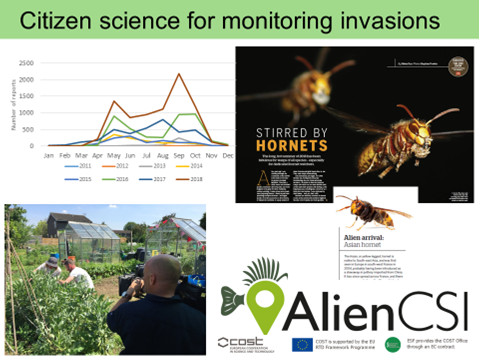Last week, the Environmental Audit Committee (EAC) published a report that calls on an 'army' of citizens to tackle the growing threat from invasive species, estimated to cost Britain’s economy £1.8 billion a year. Centre for Ecology & Hydrology (CEH) ecologist, Professor Helen Roy, tells us more about her invitation to give evidence to the EAC’s inquiry on the topic…
In London there’s a small garden surrounding the statue of Emmeline Pankhurst, which sits in the shadow of the Houses of Parliament and is a perfect place for gathering thoughts. As I sat there back in May, just before my appearance at the Environmental Audit Committee’s invasive species inquiry, it was particularly poignant to see (and record) some commonly encountered non-native species.
I have been working on invasive non-native species for 15 years and being invited to provide evidence to the EAC was a real privilege for me. It is very concerning to know that around 40 non-native species are estimated to become invasive within 20 years. So being able to present the science to inform the important decision-making and the discussions that morning on the topic was a fantastic opportunity. Chaired by Mary Creagh MP, the discussions were lively and informative with eight experts addressing diverse themes in response to the EAC.
It was incredibly exciting to hear of the enthusiasm for public engagement and citizen science from the EAC. Indeed Mary Creagh interviewed myself and fellow researchers Dr Alison Dunn (University of Leeds) and Prof Elizabeth Cottier-Cook (Scottish Association for Marine Science and University of the Highlands and Islands) for her podcast Emergency on Planet Health following the EAC session.
I was particularly pleased to hear of Mary’s interest in the collaborative study led by the Centre for Ecology & Hydrology and the GB Non-Native Species Information Portal team “Horizon scanning for invasive alien species with the potential to threaten biodiversity in Great Britain”. We discussed many of the non-native species highlighted in this study and the action that had been taken to address the threat including the launch of Asian Hornet Watch, an app which has contributed to early warning (and subsequent control) of the Asian hornet, Vespa velutina.
The inquiry recognised the escalation in non-native species arriving in the UK (and overseas territories) and the need to increase awareness of the threat posed by the most damaging of these species, termed 'invasive non-native species’ (INNS).
The commitment of people across the UK to recording non-native species is incredible. The "Alert System" part of the GB Non-Native Species Information Portal has captured the imagination of many people who have kindly provided their sightings of species of concern. From zebra mussels to killer shrimps and monk parakeets to harlequin ladybirds, the information collated on non-native species is instrumental in informing both non-native species policy and action. Additionally public engagement with research, and specifically citizen science initiatives, has contributed to understanding of the ecology of non-native species.
"From zebra mussels to killer shrimps and monk parakeets to harlequin ladybirds, the information collated on non-native species is instrumental in informing both non-native species policy and action." Prof Helen Roy, Centre for Ecology & Hydrology
The call from the EAC to increase engagement is welcome; we already have an inspiring community of volunteers recording wildlife across the UK and if we can get more people involved that’s even better! There are many varied ways people can get involved with addressing invasive non-native species from enhanced biosecurity and sharing wildlife sightings to joining a local action group.

At the Centre for Ecology & Hydrology we have been working collaboratively across Europe through the COST Action Alien CSI. In this project, we share approaches to increase understanding of non-native species through citizen science, recognising the benefits to people, policy and ultimately nature.
Helen is one of three co-chairs appointed by IPBES to lead a major, three-year global study of invasive alien species.
Read more about the Environmental Audit's Committee invasive species inquiry and report.
Listen to the Emergency on Planet Earth podcast episode on invasive species via Soundcloud.